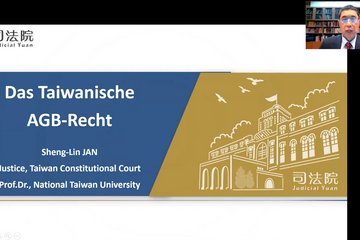Legal Issues and Society 5.0 – Theme of the new issue of the Journal of Japanese Law
Under the heading Society 5.0, Japan has launched a government programme to tackle current and future economic and social challenges with the aid of digital technologies. But the ongoing digital transformation of society raises many new legal questions. In the latest issue of the Journal of Japanese Law (48/2019), co-edited by Prof. Dr. Harald Baum, numerous articles focus on these issues.
A total of seven articles in the current issue of the Journal of Japanese Law deal with issues surrounding digitalisation. A piece by Souichirou Kozuka stems from the symposium on current developments in Japanese law that was held on 25 March 2019 at the Max Planck Institute for Comparative and International Law in cooperation with the German-Japanese Association of Jurists. The article offers an overview of the Japanese government’s declaration in its Growth Strategy 2018 that it would introduce business rules for digital platforms as a reaction to their steadily growing role in the digital economy. Above all, the Antimonopoly Act is to be used to regulate the relationship between platform operators and retailers (business users) and to monitor to what extent voluntary agreements to protect the interests of consumers via-a-vis the platforms work properly.
Six additional articles explore Society 5.0 from a Japanese perspective: Yuko Nishitani demonstrates how the frictions arising from the different standards and levels of protection in Japan, Europe (due to the GDPR) and the United States affect the protection of privacy in a globalised world. The ease of setting traps harmful to consumers on the Internet and the ways in which civil law and, in more severe cases, criminal law must react to this are the underlying core problems addressed in articles by Keizo Yamamoto on the regulation of misleading advertising in Japanese consumer protection law and by Kanako Takayama on the challenges of criminal liability for fraud in a networked society. Antonios Karaiskos and Tomohiro Yoshimasa offer a practical analysis and systematic classification of the liability of online platforms in Japan. Finally, Katsuyuki Wada discusses the extent to which information technology that has been developed can establish digital publication in law relating to the register of mobile securities and can be used for issuing loans. The articles that have now been published in the Journal of Japanese Law were first discussed at a symposium held by Ruhr-Universität Bochum and the Faculty of Law of Kyōto University, which took place on 6 July 2018 as part of Japan Science Days.
The Journal of Japanese Law is currently the world’s only Western-language publication which offers a regular and timely documentation and analysis of the myriad lines of development in Japanese law. Its goal is to make all areas of the Japanese legal system accessible in a comprehensive and methodologically structured manner. Prof. Dr. Harald Baum, Head of the Japan Unit at the Max Planck Institute for Comparative and International Private Law in Hamburg, founded the journal in 1996. Since 2004, the Institute has published the Journal in cooperation with the German-Japanese Association of Jurists.
Contents of Issue 48/2019:
Symposium
Shaping the Law for a Society 5.0
Yuko Nishitani: Schutz der Privatsphäre in einer vernetzten Welt
Keizo Yamamoto: Regelung der irreführenden Internetwerbung im japanischen Verbraucherrecht
Kanako Takayama: Herausforderungen der Betrugsstrafbarkeit in einer vernetzten Gesellschaft
Antonios Karaiskos: Liability of Online Platforms in Japan: An Overview
Tomohiro Yoshimasa: A Theoretical Perspective on the Civil Liability of Online Platform Operators
Katsuyuki Wada: Digitale Registerpublizität im Recht der Mobiliarsicherheiten
Harald Baum: Japan: Responsibility and Liability of Digital Platforms; Corporate Law Reform and Profitability
Souichirou Kozuka: Japan’s Regulatory Response to Digital Platforms
Akira Tokutsu: Do Corporate Law Reforms Increase Profitability?
Articles
Guntram Rahn: Dōri – Jōri – Jōshiki
Eric Seizelet: La féminisation contrariée des professions judiciaires au Japon
Etsushi Hosotani: Die krankheitsbedingte Kündigung und das Kündigungsschutzrecht in Japan
Ruben E. Rodriguez Samudio: Foreigners under Japanese Delictual Liability Law
Chihara Watanabe: “Science at the Bar” in Japan Case Law
Gabriele Koziol: Überblick über wichtige zivilrechtliche Entscheidungen des japanischen Obersten Gerichtshofs aus dem Jahre 2018
Reviews
Souichirou Kozuka: KŌICHI TANIGUCHI / SUNAKKU KENKYŪ-KAI (eds.)
Marc Dernauer: MASARU HAYAKAWA / SHŌSAKU MASAI / HIROYUKI KANSAKU / EIJI TAKAHASHI (Hrsg.)
Harald Baum: HIROYUKI KANSAKU / YOKO MANZAWA / SADAKAZU OSAKI / MASAKAZU SHIRAI / MASAO YANAGA
Marc Dernauer: TOSHIKO TAKENAKA / CHRISTOPH RADEMACHER / JAN KRAUSS / JOCHEN PAGENBERG / TILMAN MUELLER-STOY / CHRISTOF KARL
Moritz Bälz: BRUCE ARONSON / JOONGI KIM (eds.)
Reports
Katharina Doll: Japan in der Edo-Zeit (1603–1806) Staatsaufbau und Gesellschaftsordnung
Anna Katharina Suzuki-Klasen: Schuldrechtsmodernisierung in Japan aus rechtsvergleichender Perspektive
Ben-Said Sharif Samani: Einführung in das Japanische Recht
New books
Neue Bücher zum japanischen Recht in westlichen Sprachen











